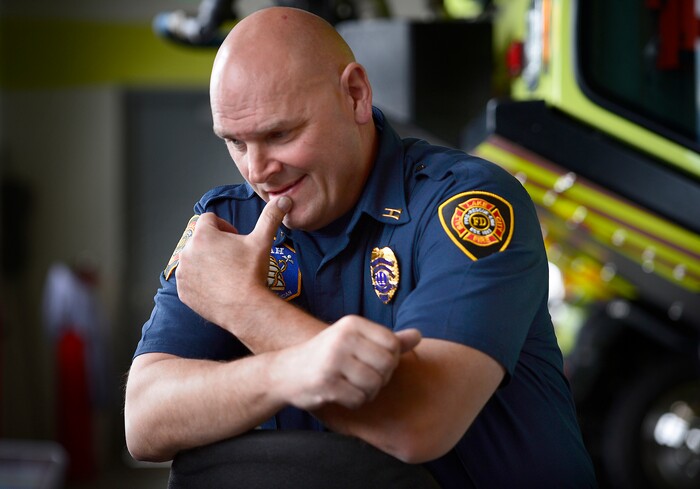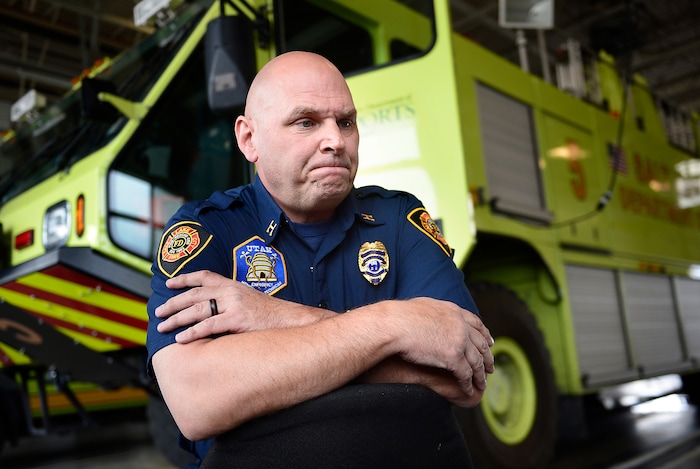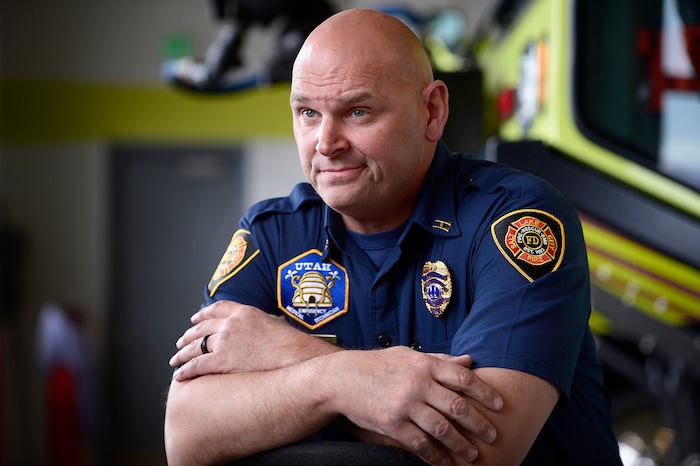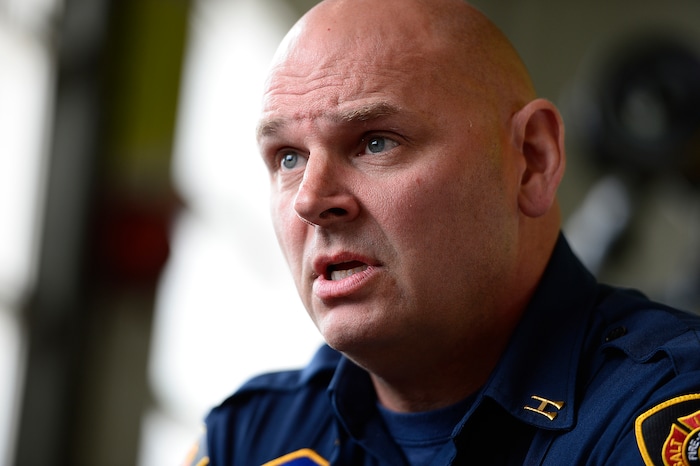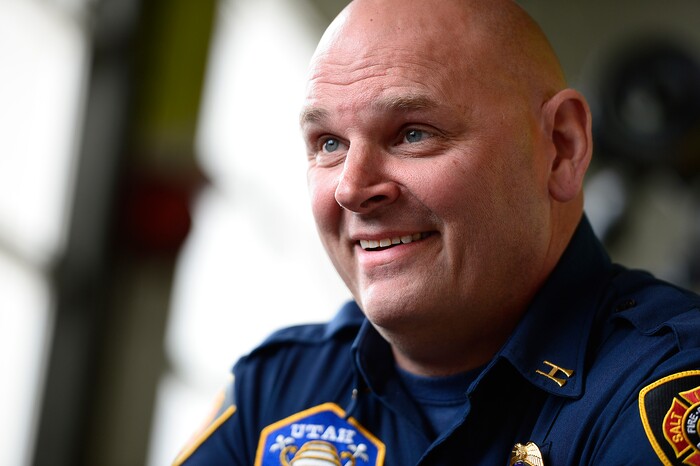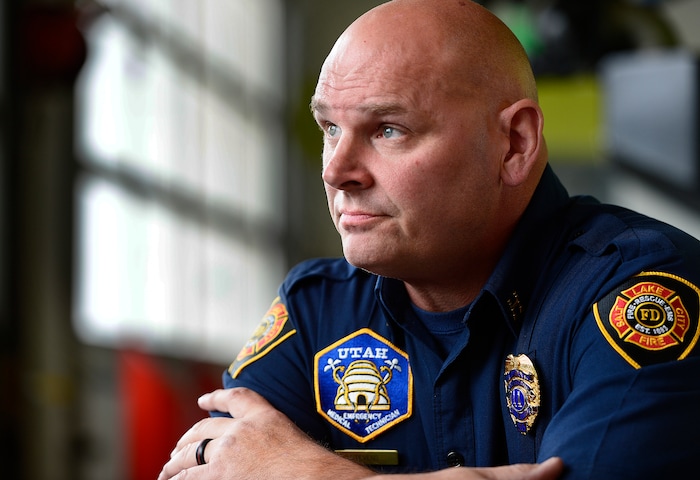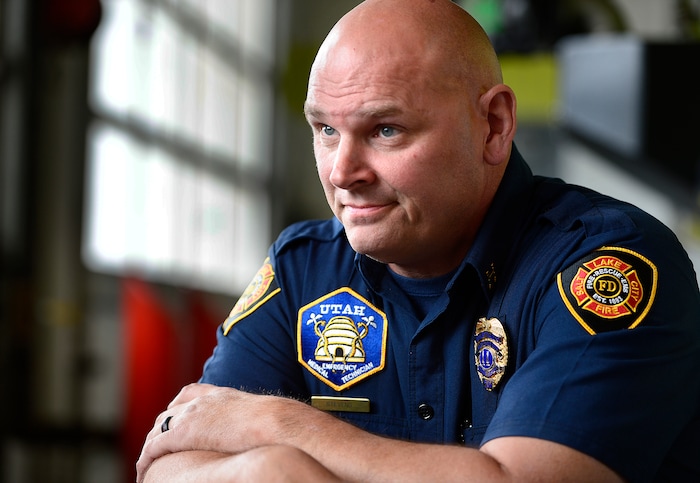After a sleepless two days at the firehouse, Capt. Mike Stevens trudged up the stairs to his bedroom and pulled out his .40-caliber handgun. He sat on the edge of his bed and began to make a mental list of the reasons he should end his own life and the reasons he shouldn’t.
He thought his wife would be able to find a better husband and, if he died, she could take the life insurance and pay off the house. He felt he was no longer making a difference. He sat there holding the gun for about 15 minutes, ticking through reasons to shoot himself.
But then, like a lightning bolt, one thought knocked aside his grim list — “There are people on this planet that I haven’t pissed off yet.”
Stevens put his firearm away and went downstairs.
He’d struggled with depression and nightmares for years, but therapy eventually helped him work through trauma accumulated over his lengthy career as an emergency medical technician and then a firefighter in Salt Lake City. Today, he urges other firefighters to protect their mental health.
“I kept my demons hidden for many years,” Stevens said. “I didn’t want to infect anyone else, that was my train of thought. There’s some logic to that, but it finds its way out one way or another.”
Stevens will join a panel of first responders on Thursday, May 24, at 7 p.m. at the Salt Lake City Main Library to talk about the toll their jobs can take on their mental health. The free event is being presented by The Salt Lake Tribune, which recently published “Officer in Distress,” a series that focused on West Jordan Detective Brent Jex and his guilt over the death of a friend in uniform.
Jex can’t appear at the Trib Talk Live event due to professional responsibilities. Instead, Tribune Editor Jennifer Napier-Pearce will interview Stevens, a 21-year veteran of the city Fire Department, along with Sgt. Lisa Pascadlo, a peer support coordinator for the Salt Lake City Police Department; state Rep. Lee Perry, a lieutenant with the Utah Highway Patrol; and Shante Johnson, a spokeswoman with the Utah Fraternal Order of Police and the widow of Draper Sgt. Derek Johnson, who was killed in the line of duty in 2013.
The stories of Jex and Stevens are similar. They are big, imposing men who grew up with an instinct to help others. They came to their respective professions early and with great enthusiasm. And over time, what they saw on the job, particularly the deaths of young children, weighed them down.
Around the year 2000, Stevens was a member of an emergency crew sent to a downtown apartment building where a boy, about 1 year old, had stopped breathing. They gave him CPR and rushed him to Primary Children’s Hospital where Stevens sat with his devastated parents. The boy died.
About a decade later, Stevens responded to a call after a father had taken cold medication, fallen deeply asleep and rolled onto his 18-month-old son. Stevens said he felt a “sinking feeling” as he handed the boy off to medics. That boy died, too.
Stevens remembers a young man dragged behind a TRAX train when it snagged the bag he was carrying over his shoulder. Stevens and his fellow firefighters picked up the man’s remains and put them in small plastic bags.
He says, generally, he can handle the blood, the car wrecks and near drownings. “But being able to say it doesn’t affect you isn’t exactly true.”
No major event led to the suicidal thoughts that spurred Stevens to pull out his .40-caliber in 2011. It was an erosion of his self-esteem and a lack of sleep, he said, driven by reliving past calls that he tends to describe as “not so good.”
In the months afterward, he tried to cope with times of stress by going the gym and chopping firewood. But then, about two years later, the nightmares came back, becoming more frequent, more alarming, until he was wracked by horrors every time he drifted off. He’d dream of the dad who rolled over on his son, and then his mind would morph that tragedy into something worse — the father died too, or maybe everyone in the house.
He ended up seeing a therapist who specializes in EMDR, which stands for eye movement desensitization and reprocessing. The therapy is used frequently for those who suffer from post-traumatic stress or similar mental health problems, including members of the military, rape survivors and first responders.
In EMDR, a therapist breaks down traumatic events into the ways a person experienced them, asking a patient to recall visual images and body sensations and hoping to help change how the brain responds to these memories.
It helped Stevens eliminate the nightmares and moderate his mood swings. He still isn’t comfortable around strangers, and has moved into a fifth-wheel camper in a remote part of Utah. He is still trying to rebuild relationships with his family.
He urges his fellow firefighters to take advantage of department resources, including peer support teams and psychiatrists available for phone conversations.
At the urging of Battalion Chief Mike Fox, researchers at the University of Utah launched an experiment called “Mind Shield” in 2017, where all firefighters participated in three one-hour training sessions meant to reduce suicidal thoughts, depression and substance abuse. That study is still underway, said lecturer Rich Landward, with the College of Social Work.
Stevens also took his advocacy beyond the bounds of his own department.
Aaron Burgin created a nonprofit called Suicide Sucks after his brother, Scott, died by suicide in 2009. The idea was to push suicide prevention ads and links higher in search results when a person types suicide-related keywords into Google or any other search engine. Burgin’s group also created YouTube videos. He asked Stevens, his stepfather, to talk directly to other firefighters.
In the video, posted in May 2017, Stevens said: “The stigma of going to seek therapy, it is not there anymore. It is more commonplace now than you think. Set your pride on the shelf and get the help you need.
“You are here for a reason. We all got into Fire and EMS to help others,” he said. “You have a gift most people on this planet don’t. You would lay your life on the line for someone you don’t know because you give a s---. Don’t take that away from someone who still needs you.”
